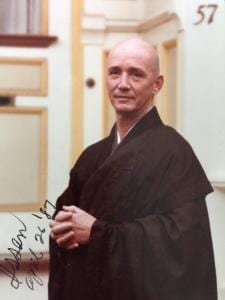I wrote this a couple of years ago. I think it worth sharing again.
Tommy Dorsey, Jr, was born on the 7th of March, 1933, in Santa Barbara. The youngest of ten, he was raised in the Roman Catholic tradition. He dropped out of college and joined the Navy, only to be discharged when discovered in a relationship with another male sailor. Tommy wound up in San Francisco where he became a drag queen, and an occasional prostitute. He also became addicted to methamphetamines. His general trajectory was not good.
Then the rise of the hippie movement sparked his latent interest in religion. There was a brief psychedelic period. And at some point attracted to Zen, he started sitting with the Japanese missionary Shunryu Suzuki, Roshi. He gave up drugs and moved into the San Francisco Zen Center. In a delightful biographical sketch of his life published by Lion’s Roar Kobai Scott Whitney writes:
“Issan claimed never to have read a single book from cover to cover, except for one: Suzuki Roshi’s Zen Mind, Beginner’s Mind. Through-out the late 1970’s and 1980’s, he moved through the world of the San Francisco Zen Center like an angel in tabi socks, as graceful and outrageous as the stage-wise drag queen he had been before meeting Suzuki Roshi.
“Unafraid to acknowledge his long history of drug use, cross-dressing and prostitution, Issan Tommy Dorsey served as a kind of fringy shaman to the uptight and elitist Zen Center community of those years-a community with an atmosphere that actor and writer Peter Coyote once called “high Episcopal.” Tommy had always been comfortable in the borderlands of respectability and could serve to welcome anyone to Zen Center, no matter how odd they seemed to the broader sangha. This benefited individual beginners whom Issan could usher through the sometimes unwelcoming veneer of the Page Street City Center. It also helped the sangha, since Tommy’s success in adjusting to the rigors of Zen training proved to them that meditation practice could benefit anyone.”
When the Gay Buddhist Club was formed Issan thought it silly. Zen is Zen, after all. And he was pretty committed to the Zen Center itself, eventually serving as director. But, he soon found himself drawn in, and quickly into leadership for the group. Eventually it was reorganized as the Hartford Street Zen Center, and Suzuki Roshi’s successor Richard Baker Roshi ordained him as a priest and put him in charge. In 1987 in the midst of the AIDS crisis the group started Maitri Hospice and Issan brought their first resident, a man named J.D. into their small community. Maitri would be America’s first Buddhist hospice.
He worked tirelessly serving both the Zen community and the young men dying all around. That strange combination of outrageousness, sweetness of character, welcoming personality, and deep, deep Zen practice attracted men and women, gay and straight. While his own death came as no shock, it was felt as a loss to Hartford Street and the Castro, the Zen Center, the City of San Francisco, the Bay Area, and in some mysterious way, the world. Someone remarkable had passed through.
People often say as Issan is increasingly recalled as something of a Zen saint, a genuinely holy figure, that it is important to remember he was a person with a boatload of personal problems. Those who knew him will then recount some foible or another. And he did have a lot of them. He was, after all, a man with a past. But, in that telling quickly, quickly, the stories of his heart and gentle wisdom, and most of all his love for everyone he encountered would take over.
Issan Dorsey was someone we can all look to as a guide on the way. He really is one of the signal figures of the founding of Zen in the West. He ranks somewhere with Shunryu Suzuki, with Jiyu Kennett, with Taizan Maezumi, with Robert Aitken, with Maurine Stuart, with Dainin Katagiri, with Kobun Chino Otogawa. The gathering cloud of witnesses to the great Zen dharma way, and who would make it Western and American. That crowd.
I only met Issan once. I represented what was then called the California Diamond Sangha at his mountain seat ceremony, installation as abbot of Hartford Street. It was a crowd. I had gotten lost going to the center, then had trouble parking, and only arrived in the building just before the ceremony, when I was escorted to a not quite appropriate spot to put on my robes. I recall Baker Roshi walking by on his way to begin the ceremony and giving me a look that seemed to say, what are you doing, and why are you doing it there? Then, right behind him, Issan also walked by, looked at me, stopped, turned full in my direction, put his hands in gassho and gave me a deep standing bow. As he raised his head, he smiled, winked, and turned to the matter at hand.
I’ve never forgotten his pause, his turn, his bow, that smile, or that wink.
Issan Dorsey, Zen priest and abbot of the Hartford Street Zen Center.
Teacher. Founder.
American Zen exemplar…













